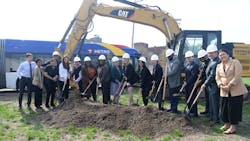Metro Transit breaks ground on Metro B Line BRT
A ceremonial groundbreaking event was held in south Minneapolis, Minn., for Metro Transit’s Metro B Line , a 12-mile bus rapid transit (BRT) route that will connect Union Station in St. Paul to Uptown in south Minneapolis. The two areas are currently connected with Route 21 service, which is Metro Transit’s busiest route. When Metro B Line service begins in 2024, it will deliver service that is 20 percent faster than Route 21 and offer connections to Metro Transit’s Blue and Green light-rail lines, as well as Metro Orange, D, A, and Green Line BRT routes.
“Riders deserve fast and reliable service, and that is exactly what we are bringing to the B Line corridor through this significant investment,” said Metropolitan Council Chair Charlie Zelle.
Metro B Line will be Metro Transit’s sixth BRT that will operate with articulated buses that will be equipped with familiar features, including wider aisles, more seating capacity and additional doors for easier passenger boarding and exiting. Stations will feature real-time NexTrip signs, shelters with lighting and on-demand heating, ticket machines and fare card readers to collect fares prior to boarding, benches, bike parking, emergency telephones and security cameras.
The $65 million B Line project is fully funded with contributions from the Federal Transit Administration, state of Minnesota and Metropolitan Council. The project cost includes funding a fleet of 21 60-foot buses, construction of more than 30 stations, building bus-only lanes on portions of Lake Street and Lagoon and Marshall Avenues and improvements to enhance accessibility, reduce crashes and improve safety for pedestrians, cyclists and other wheeled mobility options.
“The B Line’s construction is an important step on Lake Street’s road to recovery from the dual impacts of the COVID-19 pandemic and civil unrest," Lake Street Council Executive Director Allison Sharkey said. “The B Line will help more people reach the corridor to experience its cultural and commercial vibrancy while improving service to people who use transit for commuting, shopping and daily life.”
“The new B Line will make it easier for Saint Paul residents to get to work, school and recreation by increasing service and reducing travel times. Efficient transit is key to reducing the emissions that contribute to climate change. The new B Line is a win-win for our community,” added Russ Stark, chief resilience officer for the city of Saint Paul.
About the Author

Mischa Wanek-Libman
Group Editorial Director
Mischa Wanek-Libman is director of communications with Transdev North America. She has more than 20 years of experience working in the transportation industry covering construction projects, engineering challenges, transit and rail operations and best practices.
Wanek-Libman has held top editorial positions at freight rail and public transportation business-to-business publications including as editor-in-chief and editorial director of Mass Transit from 2018-2024. She has been recognized for editorial excellence through her individual work, as well as for collaborative content.
She is an active member of the American Public Transportation Association's Marketing and Communications Committee and served 14 years as a Board Observer on the National Railroad Construction and Maintenance Association (NRC) Board of Directors.
She is a graduate of Drake University in Des Moines, Iowa, where she earned a Bachelor of Arts degree in Journalism and Mass Communication.
